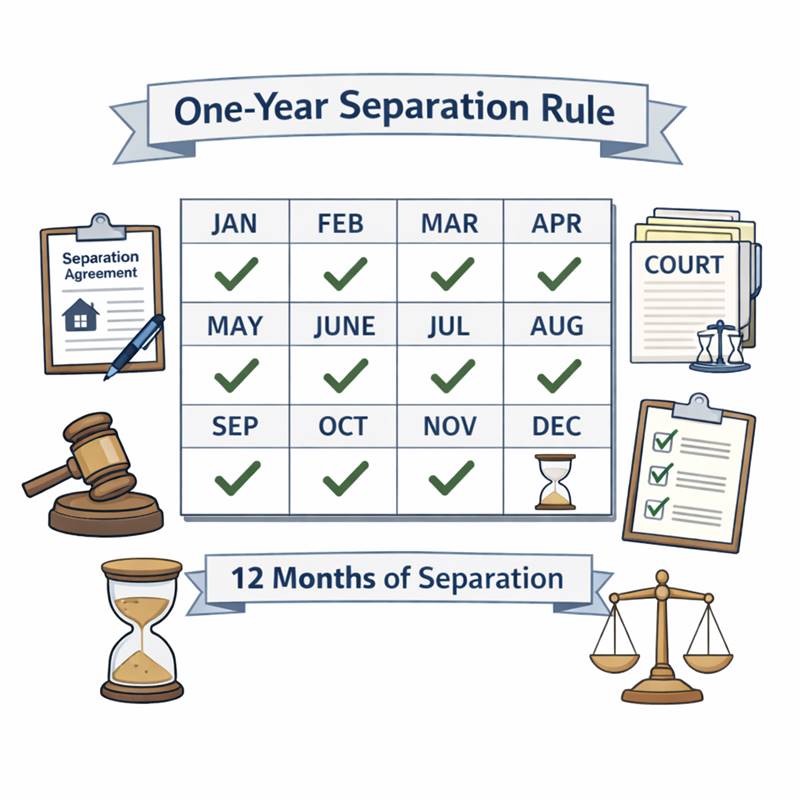Category: Divorce In Ontario
One-Year Separation Rule in Ontario

Key Takeaways
- In Ontario, most divorces are based on living separate and apart for at least one year.
- You can be separated even if you still live in the same home, depending on how you live day-to-day.
- The separation date matters because it affects divorce timing and may impact property and support issues.
- You can start divorce paperwork before the one-year mark, but the divorce usually won’t be finalized until the year is complete.

Married Spouses in Ontario: Separation and Divorce

Key Takeaways
- Married spouses have legal rights and obligations that are different from common-law partners in Ontario.
- Marriage affects divorce, property division, and matrimonial home rights.
- Issues like child support, spousal support, and parenting arrangements can still apply after separation.
- A well-prepared separation agreement can reduce conflict and save time.

What Does “Married Spouses” Mean in Ontario?
In Ontario, the term “married spouses” refers to two people who are legally married to each other under Canadian law. This means their marriage is formally recognized, whether it took place in Ontario, elsewhere in Canada, or in another country (as long as it is legally valid).
Annulment in Ontario: What It Means, Who Qualifies

Key Takeaways
- An annulment declares a marriage invalid, meaning it may be treated as if it never legally existed.
- Annulments are rare in Ontario and only available in specific legal situations.
- Most couples still need a divorce, even if the relationship was short or ended quickly.
- Even with an annulment, issues like parenting, child support, and property disputes may still need legal solutions.
What Is an Annulment in Ontario?
An annulment in Ontario is a legal process where the court declares that a marriage was invalid from the start. In simple terms, an annulment is the court saying: this marriage was never legally valid in the first place.
Limited Scope Representation in Divorce: When to Use It

What Is Limited Scope Representation?
Limited scope representation means a lawyer and client agree, in writing, that the lawyer will handle only certain parts of the divorce process. The scope of work is carefully defined at the outset and may include tasks such as:
- Providing legal advice on rights and obligations
- Drafting or reviewing a separation agreement
- Preparing court forms or financial disclosure
- Coaching a client before a case conference or motion
- Appearing in court for a specific hearing only
When Online Flirting Becomes Evidence in Divorce

Social Media Cheating in Relationships
What once seemed like harmless digital interaction can quickly cross boundaries—especially when secrecy, emotional investment, or repeated online contact begins to resemble infidelity.
Definition of social media cheating (DMs, comments, likes, emojis, secret accounts)
In Ontario family cases, “social media cheating” usually refers to digital interactions that cross the boundaries of appropriate behaviour within a committed relationship. This includes flirtatious direct messages (DMs), commenting excessively on another person’s photos, using suggestive emojis, sending private images, maintaining secret accounts, deleting message histories, or hiding online relationships from a spouse. While not always physical, the secrecy and secrecy-driven behaviour often cause the same emotional harm as a traditional affair.
How Divorce Lawyers Approach “Revenge Cheating” and Its Legal Implications

Emotional vs. Legal Dimensions of Revenge Cheating
“Revenge cheating” sits at the intersection of powerful emotions and complex legal realities. While it is often perceived as a moral response to betrayal, Ontario family law separates emotional wrongdoing from legal consequences. Understanding this distinction is crucial for anyone navigating divorce proceedings in Toronto.
In Ontario’s no-fault divorce system, the reasons behind infidelity whether it’s an initial affair or an act of retaliation generally have no bearing on property division or support entitlements. The court’s focus remains on equitable outcomes rather than emotional retribution.
That said, revenge cheating can still complicate a divorce in practical ways.
Legal Strategies for Divorcing a Narcissistic Ex-Spouses

Understanding Narcissistic Behaviour in Divorce
Dealing with a narcissistic ex-spouse during separation or divorce in Ontario can feel overwhelming, especially when their behaviour escalates in high-conflict situations. Narcissists often display patterns of manipulation, gaslighting, and financial control.
Common Traits of Narcissistic Ex-Spouses
- Manipulation and Gaslighting: Narcissistic ex-partners may rewrite events, deny obvious facts, or create doubt about your perception of reality.
- Financial Control: They might withhold support payments, hide assets, or create unnecessary financial disputes to maintain leverage. In Ontario, this can delay equalization of net family property and impact child and spousal support arrangements.
Divorce for Expats: Legal Considerations in Different Jurisdictions

Understanding Divorce for Expats in Ontario
Who Qualifies as an Expatriate under Ontario Family Law Context
In the Ontario family law context, an “expat” generally refers to:
- Canadian citizens living outside of Canada but who still maintain a legal or emotional connection to Ontario.
- Foreign nationals living in Ontario who may wish to divorce under Canadian law rather than in their country of citizenship.
- Binational couples where one spouse is Canadian and the other is a foreign national, especially when they live in different countries during the marriage or separation.
Protecting Future Inheritances in Divorce Settlements

Understanding Divorce Settlements in Ontario
A divorce settlement in Ontario is a legally binding agreement or court order that outlines how separating spouses will resolve key issues following the breakdown of their marriage. A comprehensive settlement often addresses:
- Property Division – Determining how assets and debts will be split between spouses. This includes the matrimonial home, vehicles, investments, pensions, and personal property.
- Spousal Support – Establishing whether one spouse will provide financial support to the other, the amount, and the duration, based on factors such as length of marriage, roles during the relationship, and financial need.
Legal Rights of Grandparents in Divorce Proceedings

Understanding Grandparents’ Rights in Ontario
In Ontario, grandparents can play an important role in a child’s life, and family law recognises that this relationship can be vital to a child’s well-being. Under the Ontario Children’s Law Reform Act (CLRA), grandparents do not have automatic rights to custody or access, but they can apply to the court for these arrangements when it is in the best interests of the child. This means that during or after a divorce proceeding, grandparents have a legal avenue to request access if their relationship with the child is being limited or denied.
